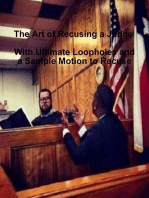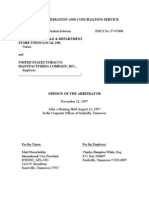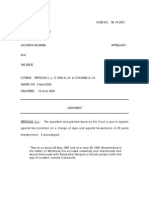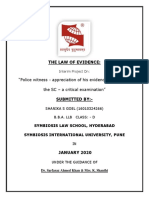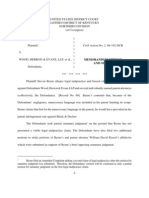Sy Evid Module-8
Sy Evid Module-8
Uploaded by
charllotecuevasganancialCopyright:
Available Formats
Sy Evid Module-8
Sy Evid Module-8
Uploaded by
charllotecuevasganancialOriginal Description:
Original Title
Copyright
Available Formats
Share this document
Did you find this document useful?
Is this content inappropriate?
Copyright:
Available Formats
Sy Evid Module-8
Sy Evid Module-8
Uploaded by
charllotecuevasganancialCopyright:
Available Formats
INNOVATIVE COLLEGE OF SCIENCE & TECHNOLOGY
Malitbog, Bongabong, Oriental Mindoro
CRIMINOLOGY DEPARTMENT
EVIDENCE
ATTY. PRINCESS JANINE R. SY
I. OBJECTIVES
1. To discuss and explain Testimonial Evidence.
2. To determine the Qualifications of a Witness.
3. To discuss and explain Privilege Communications.
II. TIME FRAME
Week 8
III. DISCUSSION
TESTIMONIAL EVIDENCE
What is testimonial evidence?
Testimonial or oral evidence is evidence elicited from the mouth of a witness as
distinguished from real and documentary evidence (Black's Law Dictionary, 5th Ed... p. 1323). It
consists of the statement of a witness offered to the court. It may be oral/live or by judicial
affidavit (RIGUERA, p. 481).
Who is a witness?
A witness refers to a person who testifies in a case or gives evidence before a judicial
tribunal (FRANCISCO, Basic Evidence, 2017, p.387).
QUALIFICATION OF A WITNESS
Who can be a witness?
All persons who can perceive(observe, maramdaman), and perceiving, can make known
their perception to others, may be witnesses.
May a witness be disqualified on the ground of religious or political belief, or interest in the
outcome of the case, or convicted of a crime?
No. Religious or political belief, interest in the outcome of the case, or conviction of a
crime, unless otherwise provided by law, shall not be a ground for disqualification (RROE, Rule
130, Sec.21).
Note: The phrase "conviction of a crime unless otherwise provided by law" takes into account
Article 821 of the Civil Code which states that persons convicted of falsification of a document,
perjury or false testimony are disqualified from being witnesses to a will (People v. Umali, G.R.
No. 84450, February 4, 1991).
Upon what matters may witnesses be allowed to testify?
A witness can testify only to those facts which he or she knows of his or her personal
knowledge; that is, which are derived from his or her own perception (RROE, Rule 130, Sec.
22).
What are the qualifications of a witness?
| Sy, Princess Janine R. Page 1 of 5
A witness must show that he has the ability:
1. To observe -the testimonial duty of perception;
2. To remember- the testimonial quality of memory:
3. To relate- the testimonial quality of narration; and
4. To recognize a duty to tell the truth- the testimonial quality of sincerity (5
HERRERA, supra at 278).
What are the disqualifications for witnesses under the Revised Rules on Evidence?
The following are the disqualifications under the Revised Rules on Evidence:
1. Disqualification by reason of marriage (RROE, Rule 130, Sec. 23);
2. Disqualification by reason of privileged communication (RROE, Rule 130, Sec. 24)
a. Between husband and wife;
b. Between and attorney or a person reasonably believed by the client to be
licensed to engage in the practice of law;
c. Between a physician, psychotherapist or person reasonably believed by the
patient to be authorized to practice medicine or psychotherapy in a civil case;
d. Between a minister, priest or person reasonably believed to be so; or
e. Made to a public officer in confidence.
Disqualification by reason of Marriage(Marital Disqualification Rule)
During their marriage, the husband or the wife cannot testify against the other without
the consent of the affected spouse, except in a civil case by one against the other, or in a
criminal case for a crime committed by one against the other or the latter’s direct descendants or
ascendants.
What are the exceptions to the marital disqualification rule?
A spouse may testify against the other in:
1. A civil case by one against the other; or
2. A criminal case by one against the other or the latter's direct descendants or ascendants
(RROE, Rule 130, Sec. 23).
Rule on Confidential Communications between Attorney and Client(Attorney-client
Privilege) (lawyer-client relationship is established once a lawyer is sought, in his professional
capacity, for legal advice and/or assistance.)
For the privilege to apply, the following requisites must be present:
1. There is an attorney and client Relationship:
2. There must be communication by the client to the attorney, or advice given thereon by
the latter to the former in the course of or with a view to professional Employment;
3. The communication or advice must have been made Confidentially; and
4. The client has not given Consent to the attorney's testimony thereon; or if the attorney's
secretary, stenographer clerk, or other persons assisting the attorney, is sought to be
examined, that both the client and the attorney have not given their consent thereto
(RROE, Rule 130, Sec, 24, par. (b)).
Note: The disqualification now includes a person reasonably believed by the client to be licensed
to engage in the practice of law (RROE, Rule 130, Sec. 24, par. (b)).
What are the exceptions to the attorney and client privilege? (FC-JAB)
| Sy, Princess Janine R. Page 2 of 5
The exceptions are the following:
1. Furtherance of crime or fraud - If the services or advice of the lawyer were sought
or obtained to enable or aid anyone to commit or plan to commit what the client knew or
reasonably should have known to be a crime or fraud;
A public officer was charged with corruption. He consulted a lawyer and they
came up with the plan of forging a certificate of arraignment and dismissal purportedly
coming from the court in order to support their claim of double jeopardy. The
communications relating to this plan are not privileged. (People v. Sandiganbayan, 275
SCRA 505 [1997])
2. Claimants through the same deceased client - As to a communication relevant to an
issue between parties who claim through the same deceased client, regardless of whether
the claims are by testate or intestate or by inter vivos transaction;
Illustration: A and B are brothers. Their father hired Atty L to draft the will. Father died.
B wants to show that their father intended Lot B to belong to B. Atty. L can testify that
the Father intended to devise Lot B to B as shown by the will
3. Breach of any duty by lawyer or client - As to a communication relevant to an issue
of breach of duty by the lawyer to his or her client, or by the client to his or her lawyer;
llustration: Where the client alleges that the lawyer’s fees were excessive, the lawyer
can disclose relevant communication to show that the case was complex and difficult
thus justifying higher fees.
4. Document Attested by the lawyer - As to a communication relevant to an issue
concerning an attested document to which the lawyer is an attesting witness; and
5. Joint clients- As to a communication relevant to a matter of common interest between
two [(2)] or more clients if the communication was made by any of them to a lawyer
retained or consulted in common, when offered in an action between any of the clients,
unless they have expressly agreed otherwise
Illustration: The lawyer was hired by lender and borrower to draft their loan and
mortgage agreement. A dispute arose between lender and borrower on whether applying
for government financial aid is an event of default. Lender can present lawyer to testify
that the parties’ intention was that such application is an event of default thus justifying
the lender into calling in the loan.
What are the requisites in order that the physician-patient privilege may be successfully
claimed?
They are the following:
1. The privilege is claimed in a Civil case;
2. The person against whom the privilege is claimed is a Physician or psychotherapist;
Note: The privilege may also be claimed against persons, including members of the
patient's family, who have participated in the diagnosis or treatment of the patient under
the direction of the physician or psychotherapist.
3. Information was acquired for the purpose of diagnosis or treatment of the patient's
physical, mental or emotional condition, including alcohol or drug addiction (RROE.
Rule 130, Sec. 24).
| Sy, Princess Janine R. Page 3 of 5
Note. The disqualification now includes a person reasonably believed by the patient
to be authorized to practice medicine or psychotherapy (RROE, Rule 130. Sec. 24,
par. (b)).
Who is a psychotherapist?
A psychotherapist is:
1. A person licensed to practice medicine engaged in the diagnosis or treatment of a
mental or emotional condition, or
2. A person licensed as a psychologist by the government while similarly engaged
(RROE, Rule 130, Sec 24 c).
What are the requisites for the rule on privileged communication between priest and
penitent?
The requisites are the following:
1. The person against whom the privilege is claimed is a minister, priest or person
reasonably believed to be so:
2. There must be a communication or confession made to or any advice given by him or
her;
3. The affected person has not given his consent; and
Note: The 1989 Revised Rules of Evidence required the consent of the person making
the confession.
4. The communication or advice was given in his or her professional capacity. in the
course of discipline enjoined by the church to which the he or she belongs (RROE, Rule
130, Sec. 2, par. d).
What are the requisites of the rule protecting communications made to public officers in
official confidence? (GOTI)
The requisites are the following:
1. The holder of the privilege is the Government, acting through a public officer;
2. The communication was given to the public Officer in confidence;
3. The communication was given during the Term of office of the public officer but the
privilege may be invoked not only during the term of office of the public officer but also
after; and
4. The court finds that the public Interest would suffer by the disclosure of the
communication (RROE, Rule 130. Sec. 24, par. (e)).
Privileged communication obtained by third persons
May privileged communication obtained by third persons remain privileged under the
Revised Rules on Evidence?
Yes. Such communication shall remain privileged, even in the hands of a third person
who may have obtained the information, provided that the original parties to the communication
took reasonable precaution to protect its confidentiality (RROE, Rule 130, Sec. 24).
Parental privilege and filial privilege
What are the parental privilege and filial privilege rules?
The parental privilege and filial privilege rules state that no person shall be compelled to
testify against his or her parents, other direct ascendants, children or other direct descendants,
except when such testimony is indispensable in a crime against that person or by one parent
against the other (RROE, Rule 130, Sec 25).
Note: Under the Family Code, the exception as to when a person may be compelled to give
testimony is when such testimony is indispensable in a crime against the descendant or by one
| Sy, Princess Janine R. Page 4 of 5
parent against the other (FAMILY CODE, Art. 215). Under the RROE, a person may be
compelled to testify against his or her parents, other direct ascendants, children or other direct
descendants, when the testimony is indispensable in a crime against that person or by one
parent against the other (RROE, Rule 130. Sec. 25).
What is the privilege relating to trade secrets?
A person cannot be compelled to testify about any trade secret, unless the non disclosure
will conceal fraud or otherwise work injustice.
Note: When disclosure is directed, the court shall take such protective measure as the interest of
the owner of the trade secret and of the parties and the furtherance of justice may require (RROE,
Rufe 130, Sec 26)
What is a trade secret?
A trade secret is a process or device intended for continuous use in the operation of the
business, for example, a machine or formula, but can be a price list or catalogue or specialized
customer list.
IV. Comprehensive check – up
1. What is Testimonial Evidence?
2. What are the qualifications to be a witness?
3. Can a wife testify in a case in favor of his husband?
Checked by:
Mrs. Melody Comia- Dimapilis
Department Head
| Sy, Princess Janine R. Page 5 of 5
You might also like
- The Art of Recusing a Judge - With Ultimate Loopholes and a Sample Motion to RecuseFrom EverandThe Art of Recusing a Judge - With Ultimate Loopholes and a Sample Motion to RecuseRating: 4.5 out of 5 stars4.5/5 (8)
- Sample Motion to Vacate, Motion to Dismiss, Affidavits, Notice of Objection, and Notice of Intent to File ClaimFrom EverandSample Motion to Vacate, Motion to Dismiss, Affidavits, Notice of Objection, and Notice of Intent to File ClaimRating: 5 out of 5 stars5/5 (23)
- (CA) (2016) 9 CLJ 73 - Small Medium Enterprise Development Bank Malaysia V Lim Woon KattDocument13 pages(CA) (2016) 9 CLJ 73 - Small Medium Enterprise Development Bank Malaysia V Lim Woon KattAlae KieferNo ratings yet
- TESTIMONIAL EVIDENCE FINALS With AmendmentsDocument75 pagesTESTIMONIAL EVIDENCE FINALS With AmendmentsAgpadEgicarlNo ratings yet
- Testimonial Evidence Finals With AmendmentsDocument79 pagesTestimonial Evidence Finals With Amendmentssted sonNo ratings yet
- Best Evidence Rule and Parol EvidenceDocument4 pagesBest Evidence Rule and Parol EvidenceMark Dungo100% (3)
- Law On Evidence PointersDocument6 pagesLaw On Evidence PointersKenneth Bryan Tegerero TegioNo ratings yet
- EVIDENCEDocument37 pagesEVIDENCEMilo EranioNo ratings yet
- Testimonial EvidenceDocument36 pagesTestimonial EvidenceJan Jan Cercado PaniqueNo ratings yet
- Testimonial Evidence PPT LUNA GOCODocument36 pagesTestimonial Evidence PPT LUNA GOCOJaszManaloAdraoNo ratings yet
- Lesson 1 (Preli M)Document4 pagesLesson 1 (Preli M)Llona, April boy M.No ratings yet
- Rules On Admissibility On Testimonial Evidence: Learning OutcomesDocument21 pagesRules On Admissibility On Testimonial Evidence: Learning OutcomesGaywaneth Kristine MusicoNo ratings yet
- Remedial NotesDocument6 pagesRemedial NotespaulNo ratings yet
- LectureDocument4 pagesLectureGesal Marie ArnozaNo ratings yet
- TESTIMONYDocument33 pagesTESTIMONYScribdTranslationsNo ratings yet
- Part VIII. Testimonial EvidenceDocument37 pagesPart VIII. Testimonial EvidenceHarold BindadanNo ratings yet
- Evidence Midterm ReviewerDocument14 pagesEvidence Midterm ReviewerCRNo ratings yet
- Sy Evid Module-9Document5 pagesSy Evid Module-9charllotecuevasganancialNo ratings yet
- BSU-QUIZ IN LAW ON EVIDENCE 2020-Part 2Document19 pagesBSU-QUIZ IN LAW ON EVIDENCE 2020-Part 2Cj GarciaNo ratings yet
- Qualifications and Disqualification of WitnessesDocument171 pagesQualifications and Disqualification of WitnessesFrancis Juarez71% (7)
- EVIDENCE (Intro To Law)Document4 pagesEVIDENCE (Intro To Law)moonriverNo ratings yet
- Laying The Foundation or Laying The PredicateDocument4 pagesLaying The Foundation or Laying The PredicateTokie Toki100% (2)
- Testimonial Evidence: Section 22, Rule 130 of The Revised Rules On EvidenceDocument27 pagesTestimonial Evidence: Section 22, Rule 130 of The Revised Rules On EvidenceJorge M. GarciaNo ratings yet
- Affidavit: BasisDocument4 pagesAffidavit: BasisMagr Esca100% (1)
- Testimonial Evidence - 2077522786Document47 pagesTestimonial Evidence - 2077522786Grenalyn QuilonNo ratings yet
- Quiz Christian Joseph GarciaDocument10 pagesQuiz Christian Joseph GarciaCj GarciaNo ratings yet
- Criminal Evidence Module 4Document7 pagesCriminal Evidence Module 4Cloyd PanesNo ratings yet
- Chapter 3Document263 pagesChapter 3Diego GregorioNo ratings yet
- EVIDENCEDocument12 pagesEVIDENCEFairy VermillionNo ratings yet
- CLJ 6 TestimonialDocument15 pagesCLJ 6 TestimonialShen De GuzmanNo ratings yet
- Testimonial EvidenceDocument8 pagesTestimonial EvidenceJay Emmanuel100% (1)
- Leonum Review RemedialLaw MacabbabadSamplex PDFDocument5 pagesLeonum Review RemedialLaw MacabbabadSamplex PDFReyrey DalisayNo ratings yet
- A N N O T A T I O N Extrajudicial Confession, 649 SCRA 689 (2011Document12 pagesA N N O T A T I O N Extrajudicial Confession, 649 SCRA 689 (2011benbern100% (1)
- Distinction Between Marital DQ Rule VsDocument1 pageDistinction Between Marital DQ Rule Vsfydah sabandoNo ratings yet
- SumitDocument12 pagesSumitdeepak guptaNo ratings yet
- SumitDocument12 pagesSumitdeepak guptaNo ratings yet
- Case Doctrines Remedial LawDocument79 pagesCase Doctrines Remedial LawNatasha Marie FloresNo ratings yet
- Testimonial Evidence I. CONCEPT: This Is The Third Kind of Evidence As To Form. It Is Evidence Consisting ofDocument50 pagesTestimonial Evidence I. CONCEPT: This Is The Third Kind of Evidence As To Form. It Is Evidence Consisting ofRomel TorresNo ratings yet
- Monika Soni PDFDocument16 pagesMonika Soni PDFdeepak guptaNo ratings yet
- University Faculty of LawDocument16 pagesUniversity Faculty of Lawdeepak guptaNo ratings yet
- Leg Res - and Justice For AllDocument4 pagesLeg Res - and Justice For AllbubuchokoyNo ratings yet
- Evidence LectureDocument2 pagesEvidence LectureKystler GomonidNo ratings yet
- NOTESDocument27 pagesNOTESRia Evita RevitaNo ratings yet
- Trustees 1Document10 pagesTrustees 1Anonymous NDFncPENo ratings yet
- DE GUIA, Patrixia JoyDocument7 pagesDE GUIA, Patrixia JoypatrixiaNo ratings yet
- RULES ON EVIDENCE Atty DitucalanDocument64 pagesRULES ON EVIDENCE Atty DitucalanPSsg Abalos LouieNo ratings yet
- RR Rao PRR LAW OF EVIDENCEDocument20 pagesRR Rao PRR LAW OF EVIDENCEarun_s_7rNo ratings yet
- Sumit 2 PDFDocument16 pagesSumit 2 PDFdeepak guptaNo ratings yet
- Sumit 3 PDFDocument16 pagesSumit 3 PDFdeepak guptaNo ratings yet
- Syllabus in Remedial Law II (Evidence) Reviewer.Document18 pagesSyllabus in Remedial Law II (Evidence) Reviewer.jimNo ratings yet
- Fernan, Jr. vs. PeopleDocument56 pagesFernan, Jr. vs. PeopleDaby BautistaNo ratings yet
- CLJ 5 EvidenceDocument36 pagesCLJ 5 EvidenceAGUSTIN, LYANNE D.No ratings yet
- Evidence Discussion NotesDocument43 pagesEvidence Discussion NotesGaille IvyNo ratings yet
- Beaumont & Tenney Bruce, Lawrence, Ross & Block: 164 Philippine Reports AnnotatedDocument3 pagesBeaumont & Tenney Bruce, Lawrence, Ross & Block: 164 Philippine Reports AnnotatedAngelie FloresNo ratings yet
- Guidelines For Hearing of Bail Application in POCSO CasesDocument5 pagesGuidelines For Hearing of Bail Application in POCSO CasesAnjali GandhiNo ratings yet
- SUCCESSIONDocument21 pagesSUCCESSIONJun Bill CercadoNo ratings yet
- ARTICLE V Privileges RulesDocument12 pagesARTICLE V Privileges RulesGregnnecia DarrettNo ratings yet
- Oral Recits For EvidenceDocument25 pagesOral Recits For Evidenceampoloquioangelyn7No ratings yet
- REEN REM (Hearsay To JAR)Document13 pagesREEN REM (Hearsay To JAR)Reen SFNo ratings yet
- Witnesses: (Type Here) Evidence Act Kenya, Cap 63 Kenya Legal ResourcesDocument3 pagesWitnesses: (Type Here) Evidence Act Kenya, Cap 63 Kenya Legal ResourcesJoy SitatiNo ratings yet
- Inbound 2972623261445296243Document9 pagesInbound 2972623261445296243marquinoclarit68No ratings yet
- RWDSU Local 150 and US Tobacco 11-11-97Document7 pagesRWDSU Local 150 and US Tobacco 11-11-97E Frank CorneliusNo ratings yet
- Script For Direct Examination of ACCUSEDDocument7 pagesScript For Direct Examination of ACCUSEDLawrence Ȼaballo BiolNo ratings yet
- United States v. Cecil Leon Ramsey, 802 F.2d 393, 10th Cir. (1986)Document4 pagesUnited States v. Cecil Leon Ramsey, 802 F.2d 393, 10th Cir. (1986)Scribd Government DocsNo ratings yet
- People Vs SantitoDocument7 pagesPeople Vs SantitoAndrew M. AcederaNo ratings yet
- Ampatuan, JR., V. de Lima, G.R. No. 197291, 3 April 2013Document11 pagesAmpatuan, JR., V. de Lima, G.R. No. 197291, 3 April 2013Karlo Ricaplaza OfracioNo ratings yet
- Admissions and ConfessionsDocument89 pagesAdmissions and ConfessionsSuzy NaeNo ratings yet
- People Vs Sta. AnaDocument3 pagesPeople Vs Sta. AnaLouie RaotraotNo ratings yet
- V1 - 147. PEOPLE Vs GARCIADocument8 pagesV1 - 147. PEOPLE Vs GARCIAmark anthony mansuetoNo ratings yet
- Yao Kee Vs Sy-GonzalesDocument2 pagesYao Kee Vs Sy-GonzalesOlenFuerte100% (2)
- People Vs MaglantayDocument8 pagesPeople Vs MaglantayDaley CatugdaNo ratings yet
- GR No. 48541 08211989 PDFDocument4 pagesGR No. 48541 08211989 PDFEuodia HodeshNo ratings yet
- Appellee Vs Vs Appellant: Second DivisionDocument7 pagesAppellee Vs Vs Appellant: Second DivisionyodachanNo ratings yet
- LatagDocument4 pagesLatagberryb_07No ratings yet
- Ndjimba V The StateDocument23 pagesNdjimba V The StateAndré Le RouxNo ratings yet
- People Vs AlincastreDocument15 pagesPeople Vs Alincastrenigel alinsugNo ratings yet
- Law of Evidence - InterimDocument6 pagesLaw of Evidence - InterimshanikaNo ratings yet
- PEOPLE Vs GERONES (Digest)Document2 pagesPEOPLE Vs GERONES (Digest)NOLLIE CALISINGNo ratings yet
- Wall v. Fruehauf Trailer Services, 4th Cir. (2005)Document16 pagesWall v. Fruehauf Trailer Services, 4th Cir. (2005)Scribd Government DocsNo ratings yet
- Order Re Expert in Patent Malpractice CaseDocument11 pagesOrder Re Expert in Patent Malpractice CaseDaniel Ballard100% (2)
- Shell Vs BordmanDocument16 pagesShell Vs BordmanCarlo ImperialNo ratings yet
- People v. NazarenoDocument7 pagesPeople v. NazarenobusinessmanNo ratings yet
- People v. Torres (GR No. 189850)Document8 pagesPeople v. Torres (GR No. 189850)Sherlyn SabarNo ratings yet
- People Vs ArponDocument2 pagesPeople Vs ArponabbyNo ratings yet
- PPL v. FajardoDocument8 pagesPPL v. FajardoG Ant MgdNo ratings yet
- 133636-1988-Zaide v. Court of Appeals20210424-14-958woDocument9 pages133636-1988-Zaide v. Court of Appeals20210424-14-958woBonnet David-santosNo ratings yet
- People v. Benito G.R. No. L-32042Document6 pagesPeople v. Benito G.R. No. L-32042French TemplonuevoNo ratings yet
- Jar-GRLDINE V.Document6 pagesJar-GRLDINE V.Danpatz GarciaNo ratings yet
- Zuhu Wang SettlementDocument24 pagesZuhu Wang SettlementKristin LamNo ratings yet
